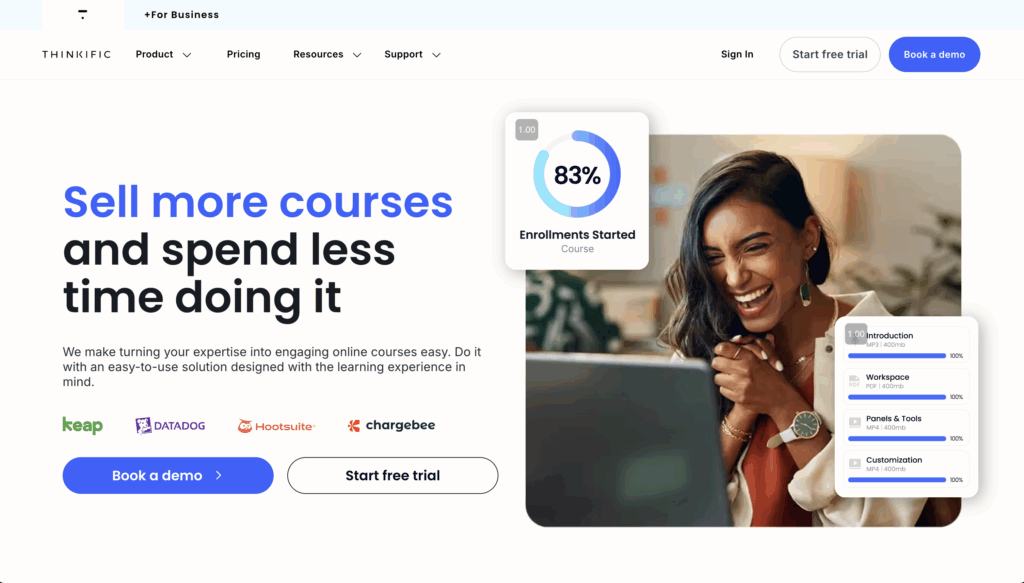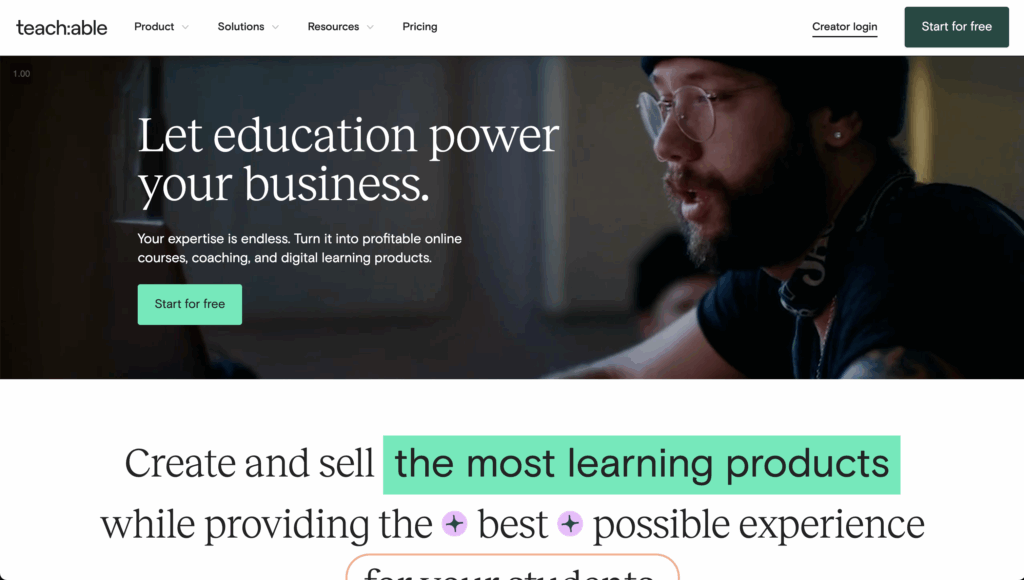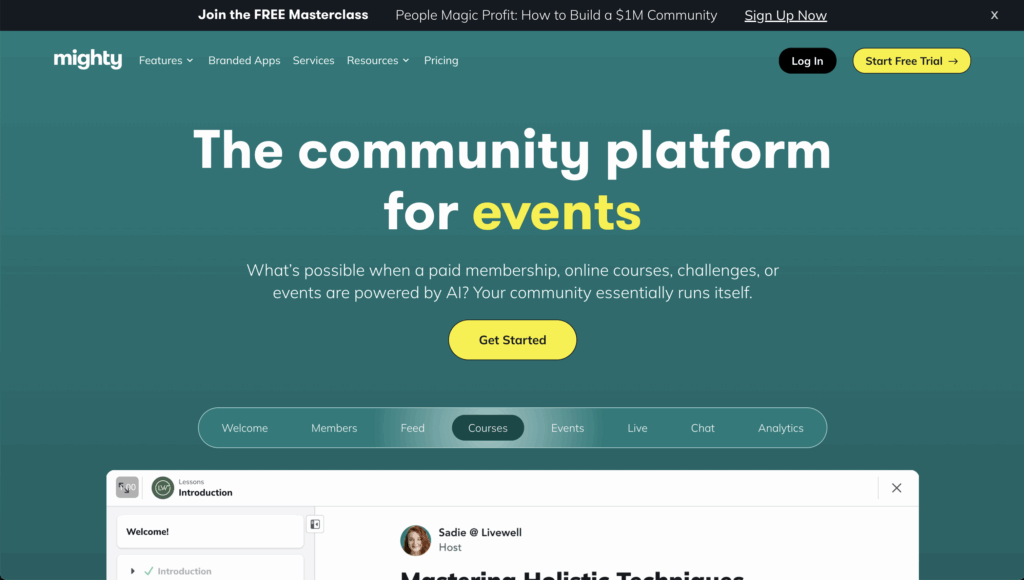7 Powerful Online Community Platforms for Affiliate Marketing (2025 Edition)

One of the coolest things about the direct response space is how many different types of affiliates there are who can find success doing their own thing!
As I shared in my article on the top 5 affiliate types, you’ve got your media buyers, your email marketers, your SEO bloggers, and your organic social influencers… But an often-overlooked route to affiliate success is community building – and honestly, now is the perfect time to build a community around your business or personal brand.
In this guide, we’ll dive into the best online community platforms for affiliate marketing and share a few tips to get you started so you can take your business to the next level!
Let’s do it.
Top 7 Online Community Platforms for Affiliate Marketing
The right platform for hosting your online community can make or break your success with affiliate marketing in a community (either on its own or as a supplementary piece of your organic blogging and content creation efforts).
It doesn’t help that there are SO many options available, ranging from robust all-in-one solutions to friendly beginner tools with limited features!
Where do you start?
Well, the good news is, we did the hard work for you. I’ve got a list of the 7 top online community management platforms used by successful creators and affiliate marketers.
Whether your focus is engagement, monetization, or both, there’s something on this list that’ll match your budget and specific needs. Without further ado, let’s see what they are!
1) Kajabi – Best All-in-One Business Platform
Kajabi is one of the most expensive solutions out there when it comes to community management platforms. In its defense, it’s also one of the best.
An all-in-one community platform for online businesses, Kajabi offers an impressive list of comprehensive features, including website hosting, course creation, email automation, podcast hosting, webinar capabilities, and more.
It has everything but the kitchen sink – and there’s definitely a bit of an initial learning curve. For that reason, users appreciate its user-friendly interface, tutorials, and 24/7 live chat support, along with a very supportive community built around it.
Plans start at $71 per month (billed annually), which many would consider pricey at first glance. But it is surprisingly cost-effective when you compare it to the costs of using separate tools for each function Kajabi offers.
Standout Features
- Website building and hosting (no separate hosting service needed)
- Easy integration with affiliate products from marketplaces like ClickBank
- Marketing funnels and landing pages
- Automate email marketing
- Video hosting built-in (no separate video hosting service required)
Kajabi Example
One entrepreneur who built a thriving community on Kajabi is Jenna Kutcher. She uses the platform to host courses and monetizes her content by seamlessly integrating affiliate links. Her success with this easy-to-manage system shows Kajabi’s effectiveness in streamlining multiple business functions!
2) Circle – Best for Community Management


Circle is a popular all-in-one community platform that creators use to craft and manage their online communities. In fact, they bill themselves as “the complete community platform,” so you know they’re serious about supporting online communities!
Circle’s easy-to-use interface brings together a range of valuable community tools in a single hub to foster deeper engagement among members. Creators can take advantage of direct messaging, discussion forums, live sessions, and options for monetizing content through memberships and subscriptions.
Circle plays very well with third-party tools like Mailchimp, Stripe, Zapier, Zoom, Vimeo, and more. These integrations boost its functionality and allow creators to set up customized workflows.
Circle also provides valuable analytics to help monitor community activity and to guarantee that members can access their community from any device. The platform offers a 14-day free trial, and plans start at $99 per month.
Standout Features
- Host engaging live events
- Offers customizable workflows for automated messages, like welcoming new members or sending event reminders
- Uses AI to suggest relevant content and identify potential issues
- Has in-depth analytics and automated video transcriptions
Circle Example
Marie Poulin, a Notion expert and creator of Notion Mastery, hosts her thriving paid community on Circle, which complements her online course. Her members take part in live sessions, offer feedback, and can even collaborate on productivity-focused topics. Marie combines structured learning with the ongoing support of her community to build a high-value, interactive learning hub where members stay engaged long after they’ve finished her course.
3) Skool – Best for Solo Creators


Skool is another all-in-one community platform, mostly geared toward solo creators to manage their communities, courses, and events. For communities, Skool earns points for its distraction-free space. It’s simple with a user-friendly interface, but it stands out because it’s tailored for creators at all different skill levels.
There are also compelling gamification features that allow members to earn points for participating via posts or comments with a levels system, which helps keep everyone engaged and motivated. Users who earn enough points can unlock entire courses or content at specific levels to reward them for participating, which is a real bonus. Skool also allows you to receive membership payments and offers a handy mobile app!
While Skool doesn’t offer native video hosting, course assessment tools, or group chat capabilities at the moment, it combines most of what creators need for course management and community building into an integrated solution. Skool offers a 14-day free trial. Its paid plan is $99 per month plus a transaction fee of 2.9% per transaction.
Standout Features
- Clean, distraction-free community space
- Simple, effective course delivery or “classroom”
- Integrated calendar
- Gamification
- All-in-one simplicity
- Built-in payment system
Skool Example
Sam Ovens is an affiliate marketer and coach who built Consulting.com’s community on Skool, monetizing his efforts through affiliate products and premium coaching services. He relies on the gamified environment to keep members active, engaged, and participating regularly.
4) Thinkific – Best for Online Courses


Thinkific is popular as a platform for creating, marketing, and offering online courses with several great advantages. Its course builder uses a drag-and-drop interface for organizing lessons and modules. It’s handy for people just starting or those without coding skills to set up on such a platform. With Thinkific, you can spend less time setting up your course offerings and more on what you do best.
It’s easy to use with a wide range of customization options, including personalized branding to help you match your site to your brand. You can integrate quizzes and surveys into your courses to keep students engaged. There’s also student progress tracking so you can see their journey as they move through your content.
If you want to try Thinkific, there’s a great free plan that offers many core features and allows you to launch a course at no cost. You can also try it out with a 30-day free trial. If you like it and upgrade to a paid plan (starting at $36 per month when billed annually), there are no transaction fees, which is a nice perk.
Standout features
- Drag-and-drop course builder that supports videos, quizzes, PDFs, and more
- Website & landing page builder including SEO optimization and customizable templates
- Flexible payments support one-time, subscription, and installment payments via Stripe and PayPal
- Robust analytics
- Marketing integrations to work with tools GetResponse, Zapier, and Google Analytics
- AI Tools that auto-generate outlines, quizzes, and translations
Thinkific Example
Thinkific user Sunny Lenarduzzi is a business strategist who uses the platform to deliver top-quality courses where she embeds affiliate links naturally within her content to boost passive income. She uses Thinkific’s analytical tools to help her continually refine her strategies to increase traffic and drive greater affiliate conversions.
5) Teachable – Best for Learning Products


For those just getting started in the online course business and looking for a cost-effective solution, Teachable may be ideal.
It’s an intuitive platform with an easy-to-use interface that allows users to create and sell coaching services, memberships, and online courses. You can design professional websites with customizable checkout, course, and sales pages with Teachable. You can get unlimited hosting for many content types, including videos. It also includes excellent features like quizzes, content dripping, and certifications to incentivize learning.
Teachable offers a free plan with unlimited courses and video hosting for a 10% transaction fee per sale. Paid plans start at $29 monthly with additional features and reduced transaction fees. Teachable is ideal for beginners, but lacks some of the advanced features experienced users will seek.
Standout Features
- Easy-to-use course builder
- Robust payment and affiliate marketing integrations
- Powerful analytics and reporting
- Customizable landing pages
- Seamless integration with email marketing tools
Teachable Example
Pat Flynn, an affiliate marketing expert, uses Teachable to offer courses with valuable content along with carefully curated affiliate product recommendations to his community. His audience appreciates his clarity and the easy-to-use interface that works well for creators and consumers.
6) Mighty Networks – Best for Mobile Communities


If mobile-first community engagement is your top priority, then Mighty Networks may be a good choice. It’s intended for creators who aim to brand and build all-in-one spaces with minimal tech setup.
Mighty has limited course features without certificates, quizzes, or bulk video upload. It offers pre-built templates for chat rooms, courses, events, and web pages for those who are short on time. Mighty Networks offers one of the best mobile experiences in the industry, including full white-label apps, which are ideal for community engagement.
If you plan to host events, Mighty Networks offers built-in support for online meetings, live video, and webinars. Check out the ambassador program too, as it’s a great way for members to get rewards for inviting others. The base community plan starts at $39 per month.
Standout Features
- Top-notch mobile app
- All-in-one community platform that simplifies setup and management
- Pre-built templates for courses, events, chat rooms, and web pages
- Built-in support for live video, webinars, and online meetings
- Cohort-based courses offer both evergreen and group-paced course delivery
Mighty Example
Mighty Networks is the home of the B-School community created by Marie Forleo. She uses her engaged network on this platform to support affiliate promotions and premium content. Her community-driven approach builds trust and increases her affiliate conversion rates.
7) Patreon – Best for Creatives


Patreon is the popular membership platform that allows creators on every platform from YouTube to Instagram to earn recurring passive income. It’s set up for creators to offer exclusive content and other perks to their “patrons.”
For adult content creators, musicians, podcasters, webcomic artists, writers, and YouTube videographers, Patreon can provide a steady stream of income earned through ongoing patron support.
Patreon allows creators to offer rewards and extras to their patrons to keep them engaged and offers multiple subscription tiers for their community, allowing them to cater to different support levels.
While Patreon has a lot to offer, there are a few drawbacks. The base Lite plan costs you 5% of your earnings, which is reasonable, but to get those earnings, you’ll pay $0.25 for each direct deposit, and those using PayPal are charged 1% of the total amount, up to $20.
Patreon doesn’t offer any built-in promotion features, so marketing has to be handled externally. Still, Patreon is a highly valuable platform for those looking to monetize their content through direct fan support.
Standout Features
- Creators can offer multiple membership tiers with different rewards
- Allows creators to earn monthly income through ongoing patron support
- Built-in communication tools support messaging and posting updates for interacting with patrons
- Access to detailed audience insights and performance analytics
- Flexible payment withdrawal options
Patreon Example
Musician and writer Amanda Palmer has built a loyal fanbase on Patreon by staying authentic and interacting personally with patrons. Through personal blog posts, behind-the-scenes content, early access to music, and intimate livestreams, hers is a fully sustainable, artist-driven space where fans share her creator’s journey.
Quick Affiliate Marketing Tips for Community Managers
Once you’ve chosen a community platform, how do you grow and get the most out of your community?
Just like with any other type of organic content play, a community is a brand. That means your first goal is to add value and build trust with your audience. Be sure you’re seeding the community with exclusive quality content, whether your community is free to access or requires a membership fee.
When it comes to affiliate marketing in communities, it’s not too different from how you approach it on an affiliate blog, website, or email. The idea is to integrate product recommendations with your tracking link into posts and content within your community (along with the proper affiliate link disclosure, of course!).
In some community platforms, you can even save or pin your own list of “recommended resources” with the products, services, and tools you recommend for your members and include an affiliate link to go with each of them.
Here are a few other quick tips:
Lead with value, not links. Before sharing affiliate products, establish credibility by answering questions and solving problems.
- Create themed content threads. Try weekly discussions like “Tool Tuesday” where you highlight helpful tools, some of which can include affiliate links.
- Use storytelling to promote products. Instead of simply dropping a link, share a short personal win or case study using the product to actually sell your audience on why they need it.
- Test and track. Use link shorteners or UTM parameters (or tracking IDs for ClickBank products) to see which individual posts and affiliate products are driving the most clicks and conversions.
Done well, affiliate marketing in a community can feel like a natural extension of your content instead of a hard sell!
Putting It All Together
The best platform for you and your community depends on your budget, goals, and skills with setup and management.
Whether you like Teachable’s simplicity, Kajabi’s robust all-in-one solution, or the mobile-first approach of Mighty Networks, each platform presents unique strengths to help you grow a thriving, monetized community.
Explore each option, take advantage of some free trials, and choose the one that best aligns with your business model and vision. The right platform can elevate your brand and help you establish a meaningful connection with your audience – both as an affiliate marketer and more broadly.
Looking to monetize your online community? ClickBank is a great place to start, offering thousands of affiliate products you can promote inside your community, group, or course platform. Get started with ClickBank for FREE by signing up here!
See you in the marketplace!



